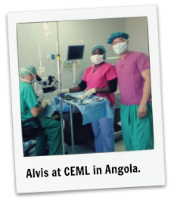 Written by Alvis Yu (Class of 2015, VFMP)
Written by Alvis Yu (Class of 2015, VFMP)
This summer, I had the opportunity to travel to Angola for a short-term medical mission, where I was paired with Dr. Steven Foster, a general surgeon at the Evangelical Medical Center of Lubango (CEML). Lubango is a city where adequate medical care and health education are lacking. Malaria is rampant and schistosomiasis plagues the many who bathe in the river waters. The roads are all unpaved and are filled with potholes. There are no traffic lights to be seen. Motorbikes are a very popular and relatively cheap mode of transportation. When combined with road conditions, this leads to many accidents that are often serious. On top of these conditions, Angola’s health system is just starting to see diseases that are commonly associated with aging, like osteoarthritis. Furthermore, with globalization, fast foods are becoming more popular for those who can afford it. This is reflected by an increase in metabolic syndrome diseases such as coronary artery disease and diabetes mellitus.
On my first day at CEML, we did several patient consults. We saw patients of all ages, coming in for diseases that spanned many disciplines, such as obstetrics/gynecology, urology, internal medicine, general surgery, orthopedics, and pediatrics, to name a few. One of the first patients we saw was a young man who came in for swelling and pain in his right knee, which had been getting worse over the past 2 years. When we did a chest x-ray on him, we found that his lungs were filled with cannonball metastases: the young man only had a few months to live. His family had to ask themselves a difficult question: could they afford to spend money on palliative surgery, so that he could live his last few months of life with less pain?
Shortly after, we saw a middle-aged woman who came in with a mass in her abdomen. It turned out that she had cervical cancer that had filled her uterus. Often, the only treatment for cancer is surgery. Regular pap tests are not available, leading to discovery of cervical cancers in very late stages, such as the one in the middle-aged women we saw that day. Over the remainder of my trip, I had the opportunity to talk with patients and to understand some of the unique challenges facing those who lived in Lubango. I assisted on operations and even had the opportunity to make a trip into Kalukembe Hospital, a rural hospital run by nurses with no on-site physicians. There are too many stories to relate, but needless to say, the experience was impactful.